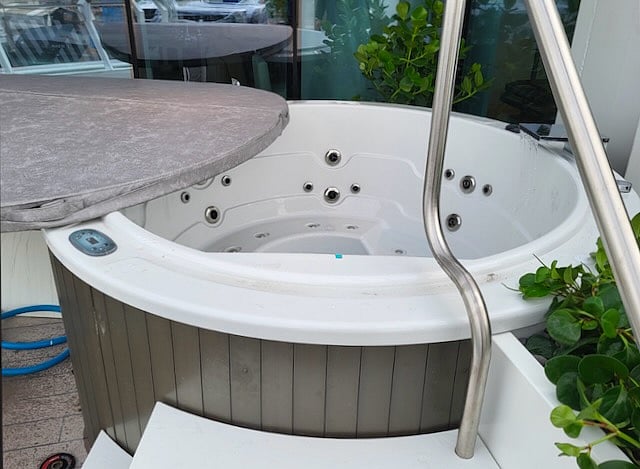Get Healthy!

- Ernie Mundell
- Posted October 24, 2024
Private Balcony Hot Tubs Spread Legionnaires Disease on Cruise Ships
Next time you're on a cruise, be wary of your (or your neighbor's) private balcony hot tub, researchers warn.
These luxe cabin features were pinpointed as a source of outbreaks of the respiratory illness Legionnaires disease that broke out on two ships.
The Legionella bacterium thrives in wet, warm conditions, so "hot tubs offer favorable conditions for Legionella growth and transmission when maintained and operated inadequately, regardless of location," said a team of researchers from the U.S. Centers for Disease Control and Prevention.
And while more public bathing spots onboard may be rigorously cleaned by staff, "private hot tubs on cruise ships are not subject to the same maintenance requirements as are public hot tubs in common areas," said a team led by Sooji Lee, an epidemiologist at the CDC's National Center for Immunization and Respiratory Diseases.
Legionnaires disease is a rare form of pneumonia caused by Legionella bacteria. The germ is sometimes found in fountains, spray parks, hot tubs, showers and faucets. People can contract the disease by breathing in a mist or vapor containing the bacteria.
The first cruise ship outbreak covered by the new report occurred on an unnamed vessel during a two-week cruise in November 2022.
By May of 2023, five passengers who took part in that cruise had gotten sick with Legionnaires, the researchers reported. Three more passengers on the same ship, but taking part in cruises occurring later in 2023 and 2024, also came down with the illness.
Six of the eight passengers were so ill they needed hospitalization, but none died.
The outbreak was the "largest cruise-associated LD outbreak investigated by CDC since 2008," the research team noted in its report.
In a second cruise ship outbreak, four cases of Legionnaires were confirmed among passengers on a vessel which embarked on various excursions in 2024.
Again, all four were so sick as to require hospitalization, although no deaths occurred.
Investigations conducted on the first ship involved testing of water from common sources of Legionella such as "heat exchangers, potable water tanks, decorative fountains and public hot tubs in common areas," according to the CDC team.
However, none of those sites turned up positive for the bacteria.
When it was realized that at least one ill passenger had their own in-cabin hot tub, water from all 10 private cabin hot tubs onboard was tested.
Water from six of the 10 private tubs were found to contain high levels of Legionella bacteria.
"The hot tubs remained closed until their operation and maintenance protocols were modified and non-detectable Legionella sampling results were obtained," Lee and co-researchers said.
A similar situation arose on the second cruise ship.
Various species of Legionella bacteria "were detected in all eight private balcony hot tubs on the ship," the CDC team noted.
After those test results, "All balcony hot tubs remained closed until each had non-detectable Legionella post-remediation sampling results," the researchers said.
What went wrong to encourage bacterial growth?
On the first cruise ship, in-cabin hot tubs' devices "were found to be operating for months in a manner conducive to Legionella growth, which included maintaining a water temperature in the Legionella growth range ... for multiple days without draining and operating with no residual disinfectant," Lee's team noted.
As well, private in-cabin hot tubs were often in the open air and located a floor above or below areas on the ship where groups of passengers might gather. According to the researchers, the Legionnaires germ could easily travel in steam emitted from the tubs and be breathed in by unsuspecting people milling about above or below.
Lee's team noted that, according to CDC regulations, private hot tubs are "not required to have automated continuous disinfectant dosing and monitoring or pH monitoring, as is standard for public hot tubs."
So, even though cruise ships are adhering to CDC guidelines, it might not be enough to protect passengers from Legionnaires disease.
"Adapting public hot tub maintenance and operations protocols for use on private outdoor hot tubs can reduce the risk for Legionella growth and transmission," they said.
The report was published Oct. 24 in the CDC journal Morbidity and Mortality Weekly Report.
More information
Find out more about Legionnaires disease at the Cleveland Clinic.
SOURCE: Morbidity and Mortality Weekly Report, Oct. 24, 2024





